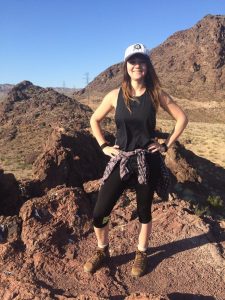Erica Lee Cantor, Field Expert
- Major: Human Biology, graduate student
- Hometown: Grand Rapids, Michigan
- (Jan 2017, May 2017 & May 2018 Teams)

How is your expert role important to the group’s mission?
My role as a field expert will allow me to apply the experience that I have gained through work in bioarcheology and forensic anthropology to help efficiently exhume remains in the Sacred Heart Cemetery. Having these experiences has reinforced my belief in the importance of dedication and hard work; exhumations are not easy, especially in the hot and humid weather of South Texas. I hope that, as a field expert, I will be able to ease this process and help to motivate and encourage my comrades in this effort.
Why is this humanitarian work important to you?
The remains that we are exhuming represent people. People who have families who likely have no idea what happened to their loved ones and are desperately seeking closure. If I can have any part assisting in the recovery of these remains so that they may someday be identified and returned to their families, then I will do what I can to make that happen. Exhumation is the first step in that process.
What do you hope to gain from this experience?
I hope to gain a broader cultural perspective and understanding of the migrant situation that is currently going on in South Texas. Having grown up so far to the North in Michigan, I have had limited exposure to this situation, and any information I have been exposed to has been mostly through media. Being in the midst of the humanitarian crisis that is occurring in Texas will likely impact me in a way that I cannot even begin to predict.
What are some of the biggest challenges you will face while in Texas?
Spiders. I have been to Texas once before and had no problem handling the cockroaches, snakes, etc. but when it comes to spiders, some irrational fear within me is triggered. More seriously, however, I believe that the whole experience is going to be a challenge – not only are the exhumations going to be hard, physical labor, but being right in the middle of the political turmoil that is going on in South Texas will present its own unique challenges.
What’s one thing people probably don’t know about you until they’ve known you a long time?
People often tell me that, upon their first reaction, I tend to come off as either intimidating or “hard.” My grandma taught me at a very young age the concept of “tough love.” What many people probably don’t realize until they really get to know me, is that I really do have a soft, caring side. It may not be apparent until I become really close with someone, but I care a lot about the well-being of my friends and families. I expect that being in such an emotional situation as the humanitarian crisis in Texas will bring this side of me out even more.
When did you know you wanted to pursue human biology as a degree, and how did you become interested in forensics?
In high school, I was always interested and skilled in the sciences. I took as many higher-level and AP science courses as I could fit into my schedule, even taking extra “zero” hours before school started. In college, I began as a chemistry major and took an Introduction to Forensic Science class, where I became extremely interested in forensic anthropology. I was actually steered away from this field for a while by a prominent forensic anthropologist and therefore spent my entire undergraduate career pursuing forensic chemistry. I still wanted to be involved in the realm of forensics, even if it meant not working with skeletal remains. I didn’t fully realize my passion for forensic anthropology until I participated in a study abroad, in which I studied forensic anthropology in London the summer after my senior year. Ever since then, I have changed my course to pursue forensic anthropology, but maintain my science background through our work in human biology at the University of Indianapolis.
What advice would you give other students interested in pursuing a human biology degree at UIndy?
Follow your heart. I know it sounds cheesy, but it’s really the best piece of advice I can give. Graduate school is never easy and there are many challenges, but if you are working on something you are really passionate about, you can overcome anything. The difficulties you may face and the time you may spend pursuing a human biology degree would pale in comparison to the regret you might feel if you don’t take the chance and go for it.
What makes UIndy’s human biology program distinctive?
Many of us in this program are focused on forensic anthropology and a lot of my fellow students have more of an anthropology background than myself. The human biology program at UIndy is an excellent mix of both anthropology-based and science-based classes so that each of us have been able to broaden our areas of expertise and knowledge. I have learned so much on the anthropology side of things here at UIndy, while also continuing to expand my knowledge in the hard sciences.
